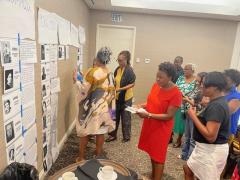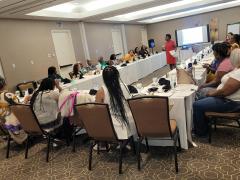Women from an array of Council 36 local unions, the Council 36 retiree chapter, and community partners came together for AFSCME Local 3634’s first ever Women’s Empowerment Luncheon on October 8.
For years, AFSCME has supported and promoted women’s issues, such as pay equity, women’s leadership development and empowerment. In 2011, former AFSCME President McEntee strengthened that dedication when he announced the formation of the AFSCME Women’s Leadership Academy. AFSCME Local 3634 Secretary Veronica Gunn was inspired by the Women’s Leadership Academy and decided to organize a Women’s Empowerment Luncheon honoring the women of AFSCME District Council 36.
AFSCME educator Tsika Pasipanodya and guest speaker Dr. Chaleese Norman uplifted attendees by encouraging them to continue to be leaders. The attendees also learned about strong women activists in labor history such as Mother Jones, Arlene Holt-Baker, and Hilda Solis. “We learned about powerful women taking the lead from the 1800s until now,” said AFSCME Local 685 Vice President Celeste Coleman II. “I also enjoyed hearing about the impact that women have made in the workforce, in politics, and in leadership. It was important to see how women paved the way.”
The retirees that attended spoke about their experiences of being women in the workplace and offered their advice and words of encouragement. “I enjoyed seeing and hearing from the retirees about what they went through and them passing the torch to us,” said Coleman II.
Overall, the Women’s Empowerment Luncheon was interactive, engaging, and intimate. The attendees were inspired to continue to be leaders in their own locals and empower other women in their workplace. Even though the labor movement has pushed women’s rights forward, there is still work to be done. Unions must continue to empower women through events like the luncheon and other trainings. “Empowerment starts with education, support, and resources,” said Veronica Gunn. “Unions can advocate for policy and contract language that improves working conditions for women and include everyone in the decision-making process through grievances and negotiations.”




